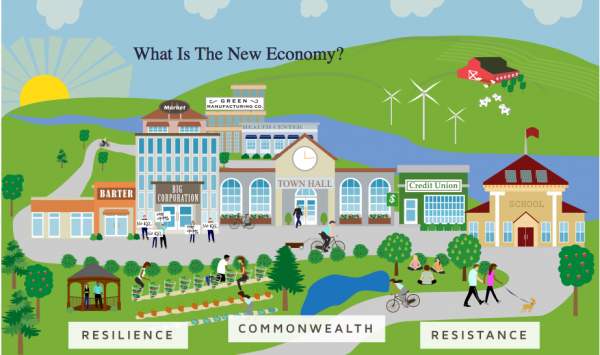Why The World Needs Transition
By Erik Curren
31 January, 2014
Transition Voice

New Economy interactive infographic from New England Transition
There are many approaches to the three main crises threatening civilization today, namely, climate change, peak oil and economic crisis. The problem is that most of them won’t work.
Weak and cowardly
Most are too little, too late. Even though stimulus and austerity take opposite approaches to fixing the economy, wherever they’ve been tried, neither has worked well to create jobs, help families keep their homes and provide opportunity for anyone except the top 1%.
Likewise, climate responses from mandatory carbon trading schemes to voluntary forest conservation programs have also failed to make much difference. The global level of greenhouse gases continues to grow, icecaps continue to melt and weird weather continues to spread.
And don’t even ask about peak oil. Because crude oil happens to be relatively cheap in the U.S. and other industrial countries just now — perhaps due to low demand from the ongoing Great Recession — hardly anyone talks about an energy crisis anymore. Instead, it’s all about how fracking will lead to a new era of cheap energy.
That’s worse than too little, too late. That’s delusion and denial.
Blind and narrow
But even if we had a response big enough to tackle any one of these world-busting crises on their own, that response would still not be enough unless it was holistic enough to address the other two crises as well. Because you just can’t adequately respond to climate change, the economy or peak oil alone. They’re all connected in what author Michael Conley has called a “Perfect Storm” of threats to modern civilization.
After all, you don’t want to fix the economy or ensure cheap energy at the expense of the environment. Because if the earth won’t support human life, it won’t matter if the Dow breaks 20,000 or gas falls to 99 cents a gallon.
In the inspired words of the late Gaylord Nelson, senator from Wisconsin and founder of Earth Day, “The economy is a wholly owned subsidiary of the environment, not the other way around.”
Broad and strong
Fortunately, there’s one movement that tries to address all three crises, while trying to make people happier and healthier as well — Transition.
You may already know why Transition is so much more promising than just about anything else out there. But a Transition group in New England has put out a fun interactive graphic that will remind you why it’s so important to pursue resilience not by itself, but together with “Commonwealth” and “Resistance.”
Take resistance, for example. Click around and you’ll see that it’s much bigger than traditional issue activism because it brings together the economy, climate and politics:
Wall Street vs. Main Street
Environmental Justice
Ending Corporate Personhood
Climate Action
Even if this kind of big picture is as old for you as a daguerrotype, it’s a view that might be new to friends and family who are used seeing issues presented alone and out of context by the mainstream media. For people who are awake and aware, Transition might be just what they’ve been looking for. So, why not share the graphic far and wide?
After all, as Wendell Berry has taught us, the world’s big problems won’t be solved by big solutions. Indeed, chasing those big answers has only helped make our current mess worse. Instead, today’s big problems can only be solved by lots of people in lots of places working on lots of little, local solutions.
So, the more people who are doing what they can where they live, the better.
Erik Curren is the publisher of Transition Voice. He co-founded Transition Staunton Augusta in December 2009
Comments are moderated
